
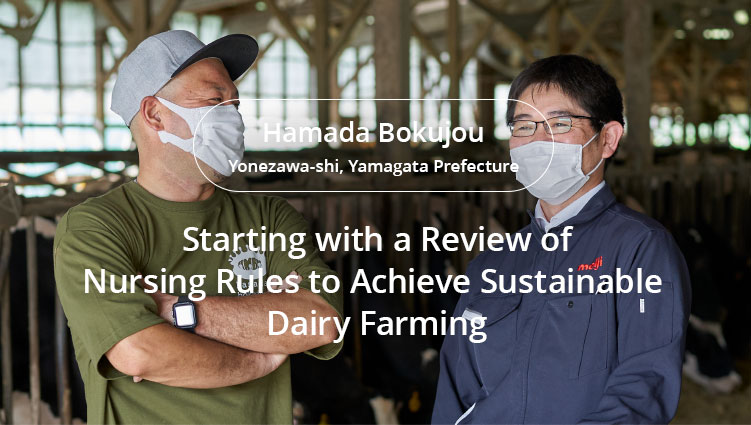
"Hamada Bokujou" is located in Yonezawa-shi, Yamagata Prefecture, just a 10-minute drive from the Shinkansen station. We interviewed Mr. Atsushi Hamada and Ms. Naoko Hamada, who work as a husband and wife, from milking to nursing, and are actively developing new initiatives that make use of their community connections.
-
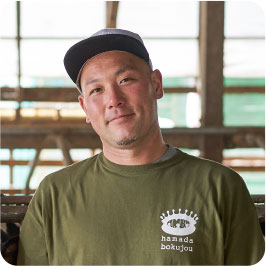
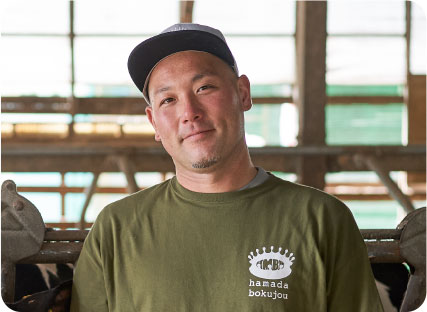
Atsushi Hamada
-
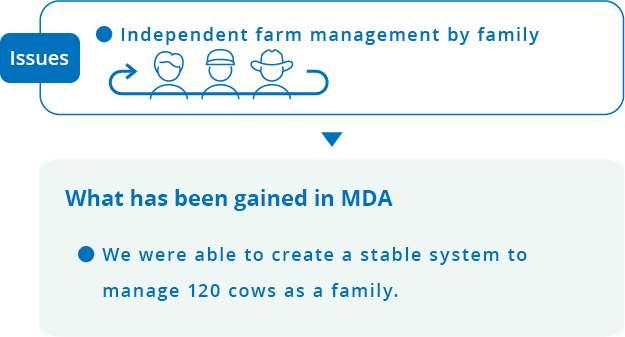
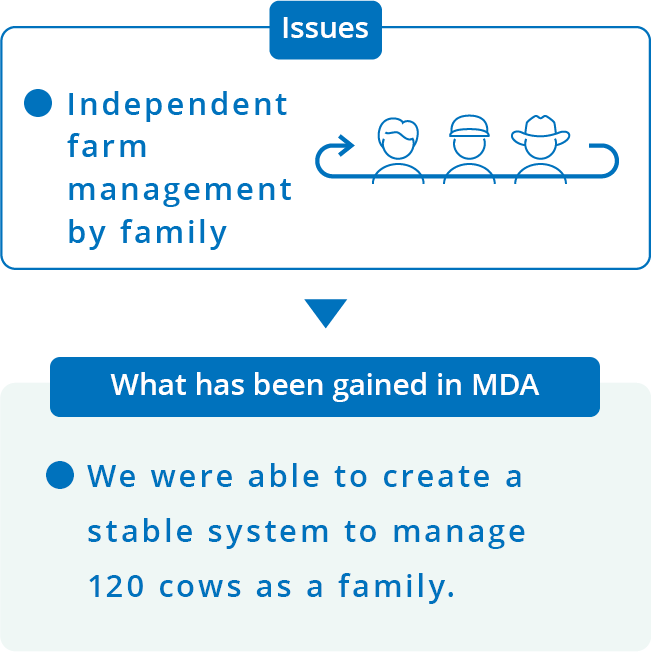
-
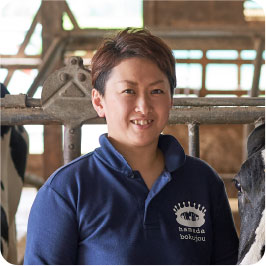
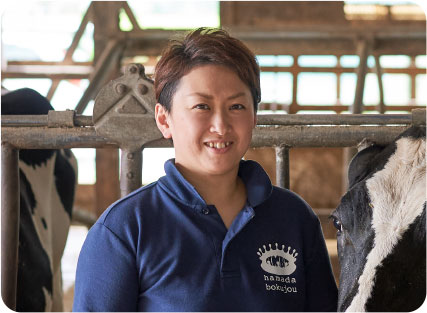
Naoko Hamada
-
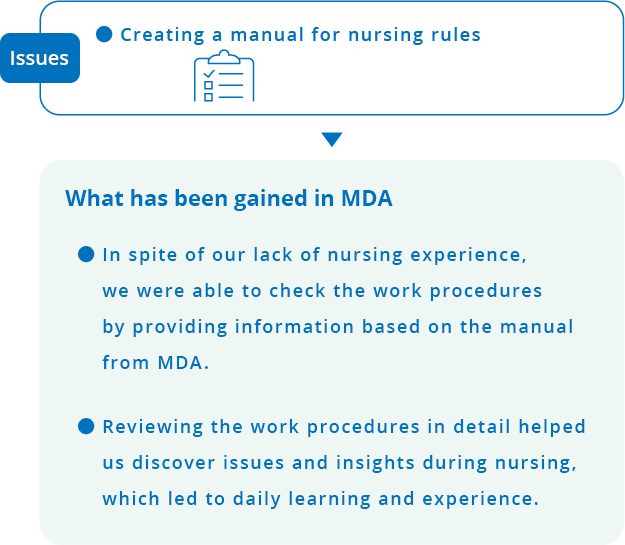
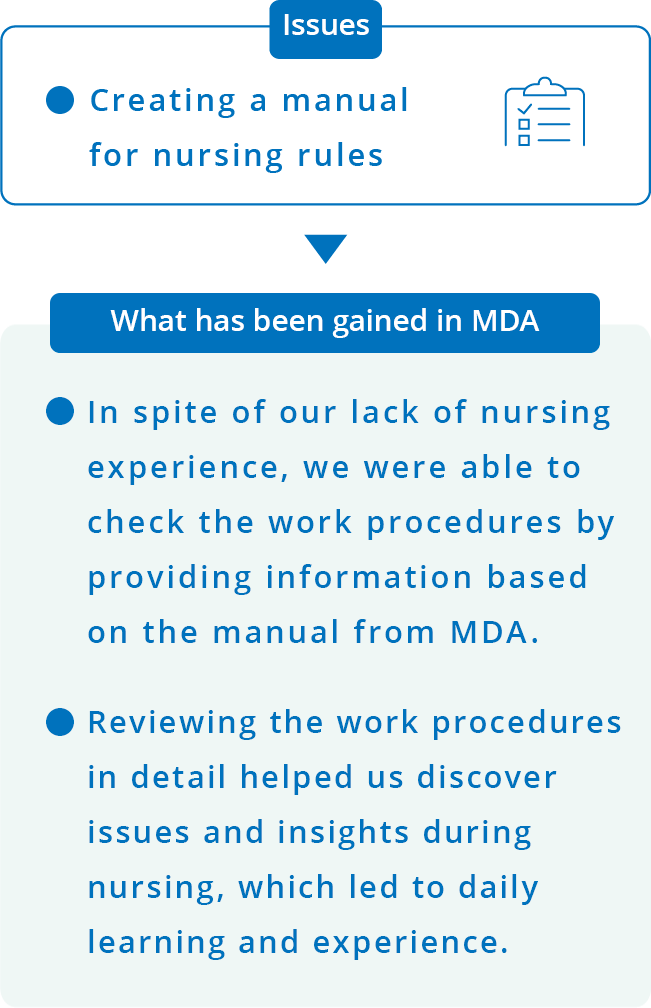
Know the reasons for nursing work procedures
and understand the causes of illness
I want to deliver delicious raw milk from my own farm to athletes around the world who will gather at the Olympics held in my country. With such a passion, farm owner Mr. Atsushi Hamada (hereafter, Mr. Hamada) acquired farm HACCP and JGAP (Japan Good Agricultural Practice: Japanese version of agricultural production process control) certification.
However, as he inquired various places to realize his thoughts, he found that there were difficult obstacles to deliver raw milk, and as a result, he decided to suspend their plan. It was the Meiji people who explained the reason.
“I was interested when I heard that Meiji was promoting farm management through Meiji Daily Advisory (MDA),” says Mr. Hamada. He agreed with the purpose of the MDA and quickly decided to introduce this initiative. In this way, in 2019, the MDA initiative at "Hamada Bokujou" has started.
-
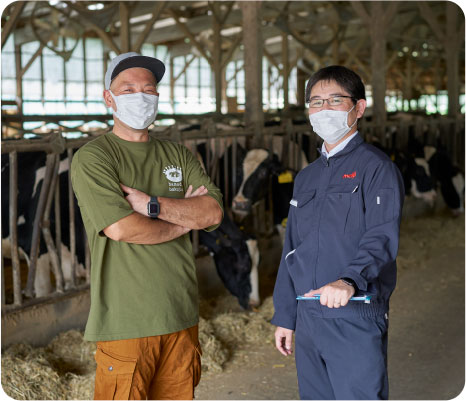
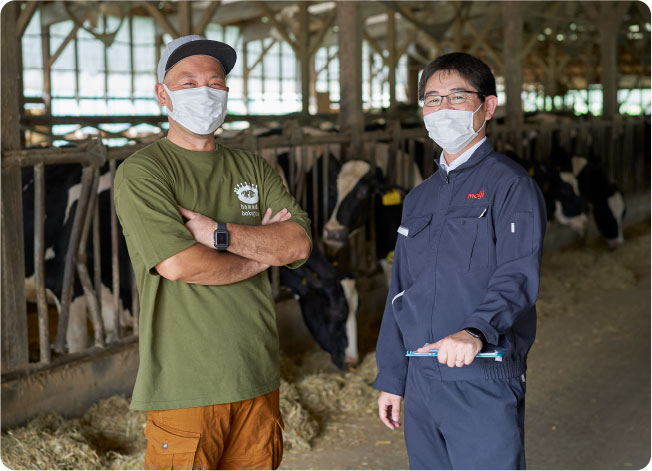
Mr. Atsushi Hamada talks with an MDA representative who visits the farm once or twice a month.
-
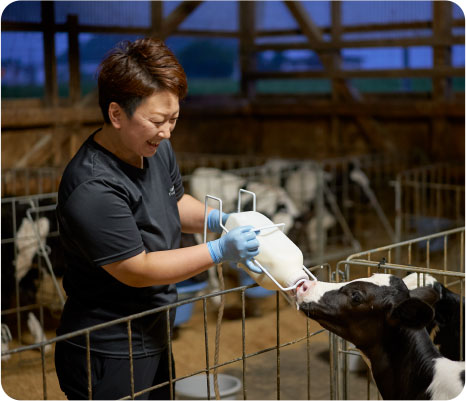
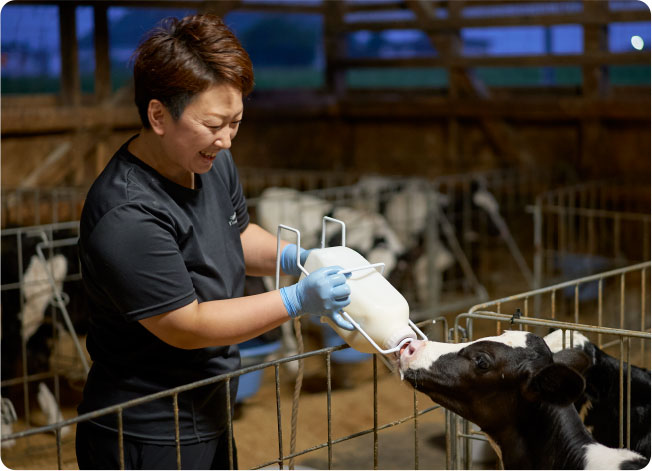
Ms. Naoko Hamada feeds more than 10 calves by herself.
As of August 2022, "Hamada Bokujou" has 120 cows. Of these, 40 are calves and non-milked cows with an average milk yield of 32-34 kg/day per cow. Calves give birth once every four days, one after another.
His wife, Ms. Naoko, is in charge of nursing. Newborn calves are exposed to various disease risks such as diarrhea and cough, but the Meiji staff has supported the inexperienced Naoko through MDA.
5 or 6 members from Meiji, Meiji Feed, and veterinarians formed a team and held study sessions to reduce disease rates, reviewed nursing work, and continued to take measures through trial and error.
Whether it is to increase body size or promote growth, once a cow gets sick, it is a waste of time before it can grow again. So we set a goal to reduce disease as much as possible," says Mr. Hamada.
“At first, I was groping, but after half a year of taking care of cows, I was able to take immediate action when I saw a cow in poor health. I think my point in looking at each cow has changed," says Ms. Naoko.
"I have come to believe that there are many things I can notice when I carefully observe even the smallest details, such as the fact that sawdust on the cow floor prevents their stomachs from getting cold and catching a cold," says Ms. Naoko.
"She will not be able to grow unless she learns the cause of the problem herself and is able to find a way to solve it. I didn't say anything at all, but left my wife learn from scratch," says Mr. Hamada.
Mr. Hamada thought about the future and watched over Ms. Naoko, which changed her own consciousness.
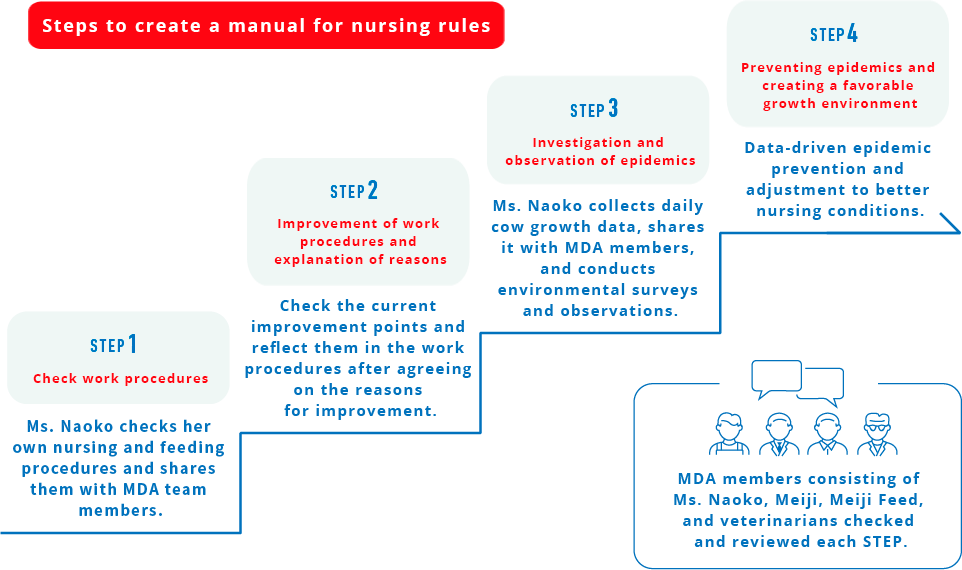
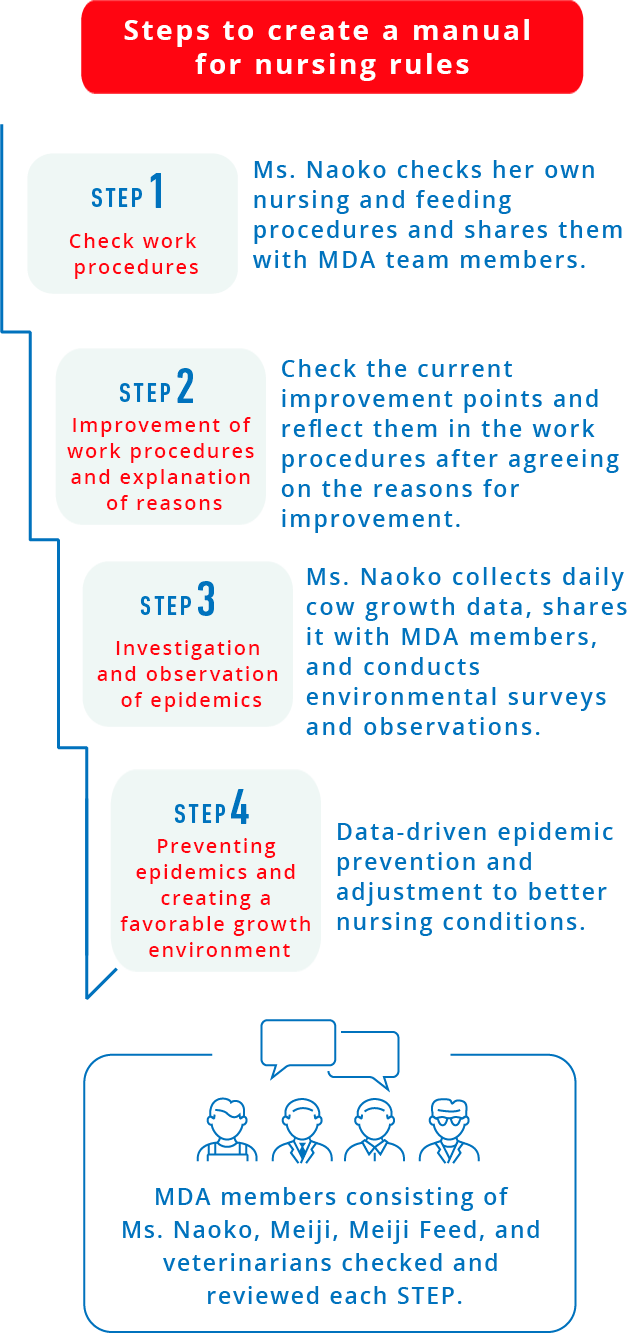
Since August 2021, we have been recording how much each calf has been suckling, how many weeks after birth it became sick, and other data, such as feeding volume, medications, and treatment response from birth to shipping and weaning. These data are statistically analyzed by the MDA team, and the points to take care based on the daily age of each calf are used for nursing.
These efforts have been successful, and we have been able to reduce the disease rates by about 60% compared with when MDA started. In the future, based on the current birth rate, the nursing reform by "Team Naoko" is underway to further reduce the disease rate of calves born.
Passion leads local community toward circular agriculture
"Hamada Bokujou" is also actively taking on new challenges, taking into consideration the future of agriculture. In order to solve the problems of odor and compost disposal, which are issues for suburban dairy farming, a biogas plant was introduced in consultation with the local community.
The plant, which aims to generate clean energy and organic fertilizer through a biogas power generation and work with local agriculture, began operations in 2020.
Prior to the introduction of a biogas plant, there were problems with compost odors and where to process it. Currently, the project is being operated as a partnership with “Hypotec Inc.” which manages and operates the facilities of “React Biogas Inc.” and three farms, including "Hamada Bokujou" that supply manure and raw materials. In addition, "React Yonezawa Corporation.", which is made up of two industrial waste companies, is also participating in the project, and they are engaged in raw material supply and sales of organic fertilizers, liquid fertilizers, vegetables, and fruit trees.
This biogas plant can accept up to 25 tons of manure at a time, and after about 70 days of fermentation, it can be used as methane gas for power generation, liquid fertilizer and compost. This plant is equipped with four agitators on the bottom and sides, and the bubbles are sufficiently agitated to produce highly pure methane gas.
In addition, the methane gas emitted from the plant is automatically burned when the capacity is exceeded, so there is no need to worry about an explosion even if the gas is full. After talking to neighboring residents and farmers about safety and the environment, we obtained their understanding before introducing the system.
-
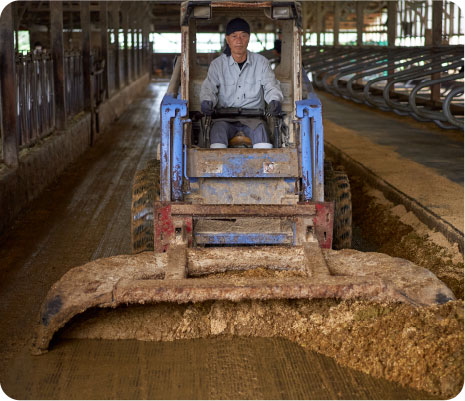
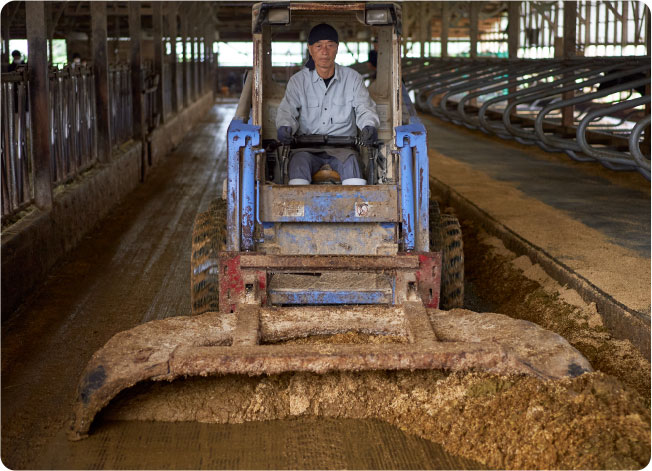
The rice hulls on the cow bed is cleaned twice a day and delivered to a power plant about five minutes away by car.
-
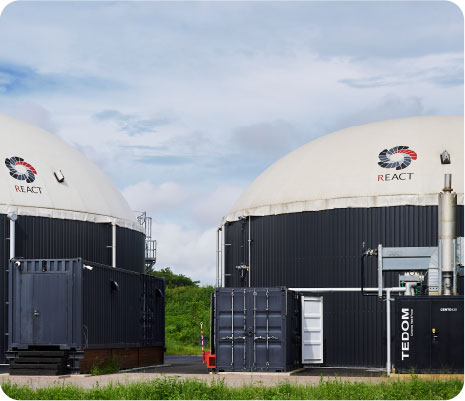
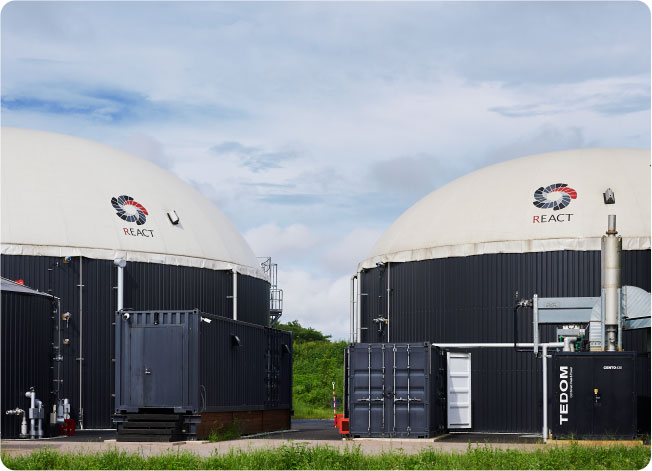
"React Yonezawa" biogas plant with a stylish appearance
In the future, Mr. Hamada plans to start another business using liquid fertilizer, compost, electricity and waste heat generated at React Yonezawa.
“Originally, each farmer, including dairy farmers, was engaged in a small circular society in the form of circulation within a single farm. The current situation is that the circle has gradually expanded.
By connecting dairy farmers and industrial waste disposal companies, which had no contact until now, manure that could have become industrial waste was reborn as fertilizer and energy, which were used by electric power companies, rice farmers, and fruit farmers. The food produced there is consumed, and the residue is returned to the plant, creating a large regional circulation.
As I participate in MDA, I really feel that the connections between people are the power to expand toward a better society," says Mr. Hamada.
The circulation involving the local community will further expand the connections between people and people. “Hamada Bokujou” is a farm that embodies such a sustainable dairy farming.






